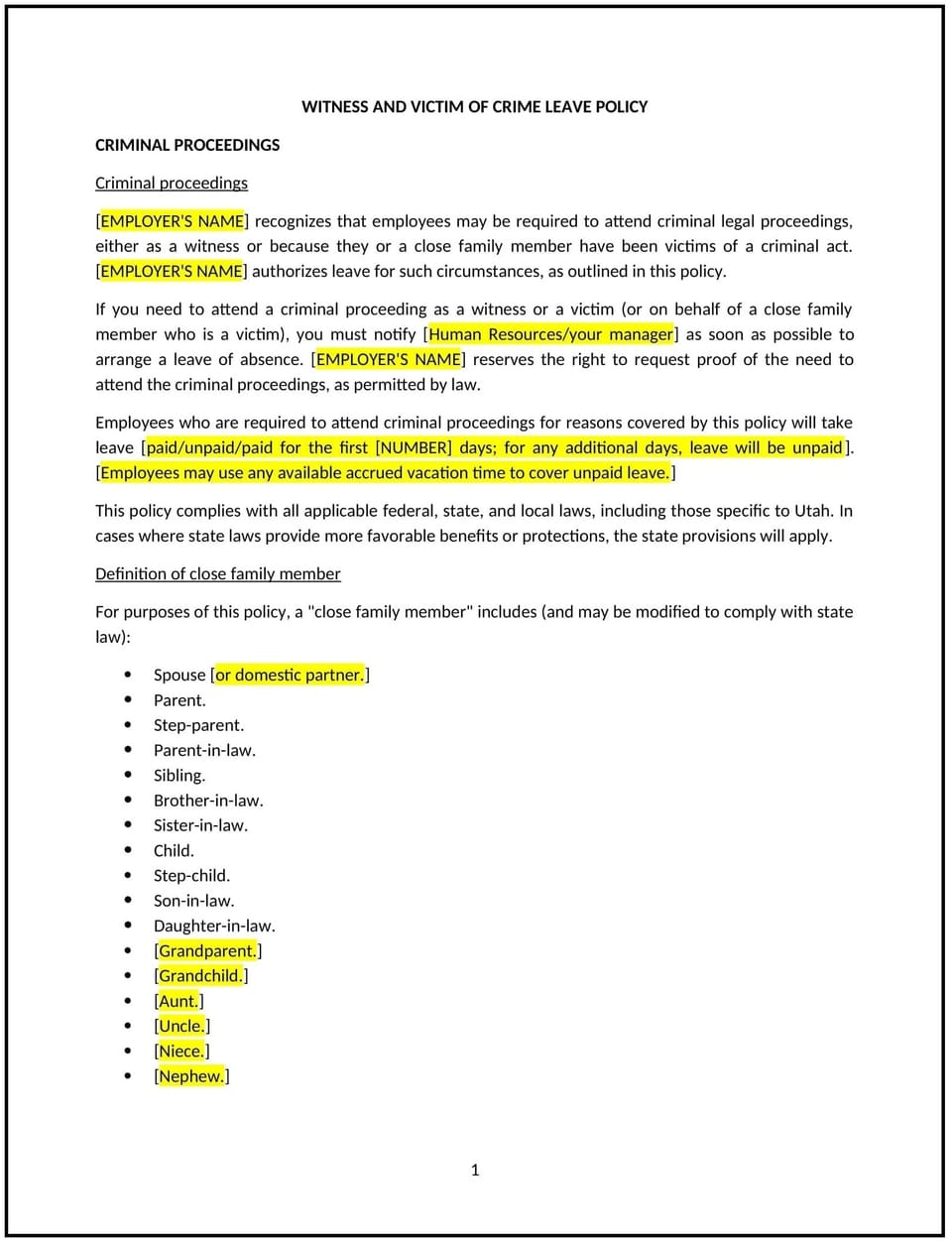Witness and victim of crime leave policy (Utah): Free template

Witness and victim of crime leave policy (Utah)
This witness and victim of crime leave policy is designed to help Utah businesses create guidelines for employees who need time off to participate in legal proceedings related to being a witness or victim of a crime. It outlines procedures for requesting leave, documentation requirements, and job protection.
By adopting this policy, businesses can support employees during challenging times, align with Utah state laws, and foster a compassionate workplace culture.
How to use this witness and victim of crime leave policy (Utah)
- Define eligibility: Clarify which employees are eligible for this type of leave, such as victims of crime or those subpoenaed as witnesses.
- Set request procedures: Provide steps for employees to request leave, including required notice and documentation.
- Address paid vs. unpaid leave: Explain whether the leave is paid or unpaid, depending on the business’s policies.
- Ensure job protection: Guarantee that employees will return to the same or an equivalent position after taking leave.
- Train managers: Educate supervisors on handling leave requests and maintaining workflow during employee absences.
- Review and update: Assess the policy annually to ensure it aligns with Utah state laws and evolving business needs.
Benefits of using this witness and victim of crime leave policy (Utah)
This policy offers several advantages for Utah businesses:
- Supports employees: Demonstrates compassion and support for employees dealing with legal proceedings.
- Aligns with state laws: Helps businesses meet Utah’s legal requirements for witness and victim leave.
- Enhances workplace culture: Builds trust and loyalty by showing employees that their personal challenges are valued.
- Reduces turnover: Encourages employee retention by providing support during difficult times.
- Maintains productivity: Provides clear guidelines to minimize disruptions during employee absences.
Tips for using this witness and victim of crime leave policy (Utah)
- Communicate the policy: Share the policy with employees and include it in the employee handbook.
- Provide training: Educate managers on handling leave requests and maintaining workflow during employee absences.
- Monitor compliance: Regularly review leave requests to ensure adherence to the policy and state laws.
- Address issues promptly: Take corrective action if leave requests are mishandled or denied improperly.
- Update regularly: Assess the policy annually to ensure it aligns with Utah state laws and evolving business needs.
Q: How does this policy benefit businesses?
A: By offering witness and victim of crime leave, businesses can support employees during legal proceedings, align with Utah state laws, and foster a compassionate workplace culture.
Q: What documentation is required for this type of leave?
A: Employees may need to provide a subpoena, court order, or other legal documentation to request leave.
Q: Is this leave paid or unpaid?
A: This depends on the business’s policies. Some businesses offer paid leave, while others may provide unpaid leave.
Q: How can businesses minimize disruptions during employee absences?
A: Businesses can cross-train employees, use temporary staff, or adjust workloads to maintain productivity during absences.
Q: How often should businesses review this policy?
A: Businesses should review the policy annually or as needed to ensure it aligns with Utah state laws and evolving business needs.
This article contains general legal information and does not contain legal advice. Cobrief is not a law firm or a substitute for an attorney or law firm. The law is complex and changes often. For legal advice, please ask a lawyer.


